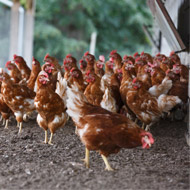OIE calls on China to act on avian influenza outbreak

“Efforts need to target eliminating H7N9 from affected farms and markets”
Animal health organisations are calling for reinforced control efforts amid an outbreak of avian influenza in China.
The World Organisation for Animal Health (OIE) and the Food and Agriculture Organisation of the United Nations (FAO) urge countries in the region to be vigilant for the H797 virus that can be lethal for humans.
Urgent investment in surveillance and laboratory detection would reduce the risk associated with virus spread and impacts on public health, they said.
“Considering the potential for mutation of avian influenza virus, constant surveillance by national veterinary services of the different strains circulating in animals in their country is essential to protect both animal and human health,” explains Dr Matthew Stone, deputy director general of the OIE.
“Efforts need to target eliminating H7N9 from affected farms and markets,” added Dr Vincent Martin, FAO’s representative in China.
“Targeted surveillance to detect the disease and clean infected farms and live bird markets, intervening at critical points along the poultry value chain - from farm to table - is required. There should be incentives for everybody involved in poultry production and marketing to enforce disease control.”
It is not until recently that the H797 virus started to infect humans. New evidence shows that the virus recently shifted from low to high pathogenicity. Where once it would cause mild or no illness in poultry, a genetic change means that it can lead to high mortality for birds within 48-hours of infection.
The OIE says that this shift makes it easier to see when chickens are infected, but also raises the risk of severe animal and economic losses for those involved in poultry production.
“China has been quick to notify international organisations about the virus’ recent change from low to high pathogenicity in poultry. Given the continuous risk of virus change, inherent to all influenza viruses, timely sharing of surveillance results and sequence information with the international community is crucial for pandemic preparedness,” said Dr Stone.
The OIE and the FAO claim that the need for ongoing targeted and widespread monitoring of the disease remains urgent to keep the virus spreading from China’s Eastern and Southeastern regions, where it is considered endemic.
So far, the strain has not be reported in populations outside of China, despite intensified surveillance in neighbouring countries and those at risk.



 The BSAVA has opened submissions for the BSAVA Clinical Research Abstracts 2026.
The BSAVA has opened submissions for the BSAVA Clinical Research Abstracts 2026.